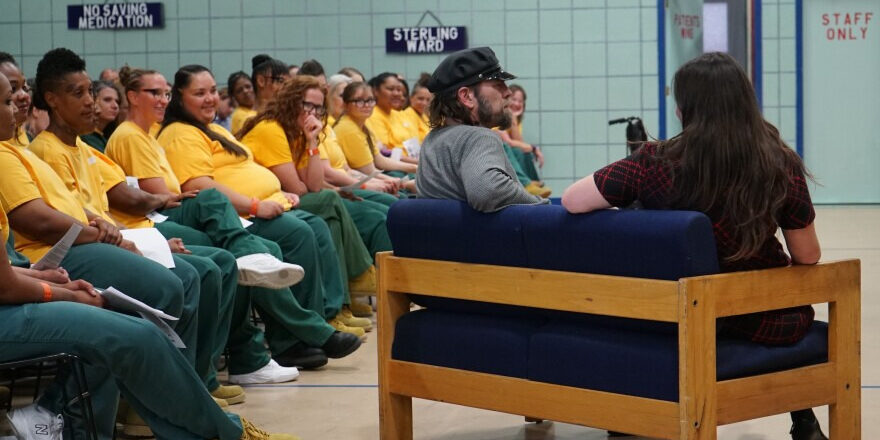![]()
In a gymnasium located in northeast Denver, a captivating performance of the play ‘One Flew Over the Cuckoo’s Nest’ is taking place. As the lights dim and synthesized music fills the air, Chief Bromden, played by Douglas L. Micco, stands on a box, narrating the story to the audience through his hallucinations. However, what makes this production unique is that the male actors are not professionals but inmates from the Sterling Correctional Facility.
The University of Denver Prison Arts Initiative (DU PAI), in collaboration with the Colorado Department of Corrections, has organized this partnership to empower incarcerated individuals, normalize the prison environment, and prepare them for a positive life after release.
Under the guidance of DU PAI founder Ashley Hamilton, the incarcerated men have been involved in every aspect of the production, from music and set design to stage management. The collaborative process began in April, with weekly rehearsals that gradually expanded to 10- to 12-hour days as they approached the technical rehearsals.
For Micco, playing Chief Bromden represents an opportunity to express himself and transcend the confines of prison life. He views his acting role as a professional job, emphasizing the importance of teamwork and accomplishing shared goals.
“I think the best part has been being able to express myself, to be able to go out and step out of the prison itself, the prison, the mentality, the mental thinking,” he said.
Micco and the rest of the cast and crew are part of the University of Denver Prison Arts Initiative (DU PAI). The initiative aims to empower incarcerated individuals through the transformative power of arts and education, offering them opportunities for personal growth and self-expression.
The incarcerated men at the Sterling Correctional Facility have worked diligently on every part of the production. From composing the music to designing the sets and managing the stage, they have dedicated their time and energy to create a remarkable theatrical experience.
Luke Barela, one of the music and sound designers, attests to the rehabilitative nature of the experience. Being responsible for his role in the production has allowed him to develop a sense of purpose and reconnect with the outside world.

The incarcerated men have been rehearsing for months, working together to perfect their performances. Micco emphasized the importance of teamwork and setting and achieving goals as a unified unit.
“I don’t have to like everybody, I don’t have to be best buddies, but when we’re here, we have to accomplish, we have to set goals, attain the goals, set higher goals, and begin to work as one unit,” he said. “We’ve done that, and I’m very happy.”
The play, which premiered at the Sterling facility on August 28, received overwhelming support from family, friends, and the public. The cast and crew then took their production on the road, performing at other prisons, including the Denver Women’s Correctional Facility.
“It’s a great opportunity for us to provide them another outlet of expression and to bring humanity, more humanity back into incarceration and institutions,” said Ryan Long, warden of the Denver Women’s Correctional Facility. “Then to provide them an opportunity to get out of what they normally do.”
The performances at the Denver Women’s Correctional Facility showcased the power of art to bridge gaps and foster connection. Both female inmates and members of the public attended the show, immersing themselves in the captivating performances and demonstrating the transformative potential of the arts.
Jamiylah Nelson, an inmate serving life without parole, expressed her admiration for the production, particularly highlighting a scene that resonated with her personal experiences within correctional facilities.
“Just small things like that within facilities, which I think is changing now,” Nelson said. “But back in the day, it used to be really petty, and things that didn’t matter, mattered so much.”
The Department of Corrections hopes that programs like DU PAI will continue to normalize the prison environment and shift societal perspectives towards incarcerated individuals. Nelson’s participation in DU PAI’s theater program at the women’s facility has already provided her with a sense of purpose and personal growth. She eagerly anticipates her involvement in the upcoming production of ‘A Christmas Carol,’ aiming to challenge societal norms and facilitate positive change.
Through outlets for creative expression and the fostering of community, initiatives like DU PAI strive to empower incarcerated individuals, humanize the prison environment, and prepare them for a brighter future beyond the prison walls. The transformative power of the arts has the potential to create lasting change in the lives of those impacted by incarceration, offering hope, personal growth, and an avenue for rehabilitation.













